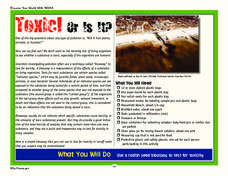California Academy of Science
Notice and Wonder
Pint-sized zoologists practice the art of observation. They take notes, pictures or written, as they observe an animal for a period of time. This can be done at the zoo, with a visiting classroom animal, or perhaps at the humane society....
California Academy of Science
What Would Happen?
Nothing says classroom fun like an invertebrate and a magnifying glass! Snails, earthworms, and roly-poly bugs become the center of attention as pint-sized investigators hone their inquiry and observation skills. They are guided through...
Curated OER
Weather Instruments
Third graders practice making predictions about weather from conditions they observe on weather instruments and weather reports. Learners are introduced to the most basic weather reporting instruments: the thermometer, the wind vane, the...
Curated OER
Gas Law Investigation
Investigators collect the carbon dioxide produced when an antacid tablet is activated and identify what alteration produced the most gas. They also collect the gas in a buret in order to practice precision. Then they choose between two...
Curated OER
Condensation Polymerization
This organic chemistry lab activity is appropriate for teaching polymerization, percent yield, melting point, or the types and uses of polymer materials. Chemistry pupils imagine that they are working for a company to develop a special...
Curated OER
Condensation Polymerization: Preparation of Nylon 6/6
Students participate in a lab activity in which they synthesize nylon 6/6, calculate the percent yield by mass, identify the polymer as thermoplastic or thermoset, and determine the melting point, density and end-product use of the polymer.
Curated OER
Inquiry into Consumer Products
High schoolers recognize different consumer products, found in and around the home, that have reactive or denaturing properties when used together. They explore chemical and physical properties of each product by identifying chemical...
Curated OER
Roger Recycle
Students investigate the uses of aluminum and the importance of recycling. they then write a script and produce an informative and entertaining video about about aluminum recycling.
Curated OER
Flower Dissection
In this science worksheet, students follow directions for dissecting a flower. Kids tape the parts of the flower in the corresponding boxes. Students also read about how flowers reproduce and analyze a related diagram.
Curated OER
Parts of a Plant
First graders discover the parts of a plant. For this science lesson, 1st graders identify and label the parts of a plant and record their findings on a word processor.
Curated OER
5 Step Food Chain Lesson
Have your class discuss food chains using this resource. Learners watch a presentation on the food chain and how we are dependent on the smallest life forms. They write newspaper articles and create an illustration describing the food...
Horticultural Society of New York
Dress Up Your Salad
Salad dressings use a variety of different ingredients, but it's important to have a healthy balance of greens to create a delicious mix. Young chefs examine five types of herbs including chives, basil, dill, parsley, and thyme to make a...
Curated OER
Natural Selection
Kids act as scientists and preditors in this short natural selection activity; they collect and analyze data, then apply their new knowledge to real-world examples of natural selection. The layout of the worksheet is easy enough to use...
Global Change
The Carbon Cycle and its Role in Climate Change
So how does the carbon cycle work? Kids participate in a hands-on activity that allows them to understand the chemistry behind climate change and global warming. They act out the process of photosynthesis by labeling themselves as...
NOAA
Toxic! Or Is It?
Super scientists tests the toxicity of water using radish seed bioassays. Over the course of five days, scholars observe the germination process of several radish seeds, looking closely at their roots to determine the level of toxins...
Curated OER
Swamps, Shrimp, and Tsunamis: A Simulation of Sustainable Development Issues in Coastal Ecuador
Students examine the economic benefits, environmental losses and dangers of the shrimp farming industry on the coast of Ecuador. They read a script, role-play people involved in the shrimp business, and write an essay of the pros and cons.
Curated OER
Why Can’t I Have Sugar? All About Diabetes
Begin the lesson by having your class write what they know about diabetes. They learn through a skit how the body metabolizes glucose. A visual representation of the two types of diabetes is displayed, and then learners participate in...
Curated OER
Wheeling and Dealing NPS Wheel
A collection of three worksheets create a "Wheeling and Dealing NPS Wheel" when properly cut out and fastened together, This activity would be perfect when used with any study of how our water sources get polluted.
Desert Discoveries
Built for the Desert
The saguaro cactus has an amazing ability to survive in a harsh environment. Learners identify the many adaptations for desert life that the saguaro employs. They look at each part of the saguaro and determine what role it plays in the...
Desert Museum
Daisy Ecology
Here's a fine lesson that combines poetry with life sciences. Learners carefully listen to a poem that's all about a food chain. As the poem is read, learners name the producer, the herbivore, the carnivore, and the omnivore. Lots of...
SeaWorld
Animal Husbandry
Learners study how changes in the environment can drastically affect the survival of an animal. After a class discussion, pupils are divided up into groups and are given the task of coming up with the best environment to allow brine...
Curated OER
Probability Exercise
Follow fruit fly genetics with this probability activity. Biology scholars analyze the alleles of Bugsy, Daisy, Dino, and Lulu, considering traits for antennae, wing type, and eye color. They solve Punnett squares to determine the...
Curated OER
Evaluating the Strength of Scientific Evidence: The Rediscovery of the Ivory-billed Woodpecker
A happy discovery occurred in Arkansas in 2004: a woodpecker, believed to be extinct since the 1940s, reappeared! Or did it? Middle to high school ecologists examine scientific evidence and use critical-thinking skills to determine...
Curated OER
Heterogeneous Equilibrium: Measurement of a Partition Coefficient
In this chemistry worksheet, students examine a concept in science and then use the knowledge in application by conducting an experiment.

























